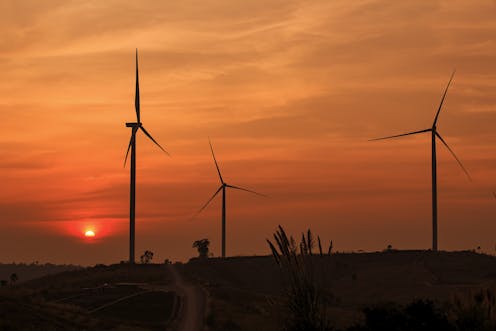Business owners see cutting carbon emissions as 'the right thing to do', despite the challenges of making change
- Written by Pii-Tuulia Nikula, Principal Academic, Eastern Institute of Technology

An increasing number of businesses in Aotearoa New Zealand are changing how they operate to reduce their overall climate impact. These measures, which include reducing carbon emissions, are largely voluntary outside of specific sectors, such as the fuel, energy and waste industries[1].
So, what motivates businesses to take climate action when they do not have to?
As part of my research[2], I interviewed 13 businesses in Aotearoa New Zealand to better understand their climate mitigation efforts and experiences.
All of the businesses had made a voluntary commitment to reduce their emissions. Many of these businesses had reduced their carbon footprints by changing how they approached freight, business travel, energy use and waste.
Understanding the drivers and challenges businesses face when implementing climate-friendly measures is important as we consider how to accelerate the fight against climate change.
Driven by values
Underlying values were one of the key reasons for the introduction of voluntary climate mitigation measures. Climate action was often framed as simply the “right thing to do”.
My work found that more traditional economic considerations did not appear to explain the initial decision to reduce the carbon footprint of the business.
Read more: Plastic pollution in Nigeria: whose job is it to clean up the mess?[3]
That said, many interviewees reported benefiting financially thanks to cost savings – for example, from improved energy efficiency or lower business travel and freight-related costs. These types of activities could be framed as “win-win” situations, where environmental and financial goals aligned.
Many of the interviewees also believed that climate action contributed to their brand image and reported positive feedback from customers or employees.
Barriers to climate-friendly action
On the flip-side, most businesses also reported challenges that limited further sustainability efforts.
Many of those interviewed did not think there was sufficient customer willingness to pay the price premium for climate-friendly products or services in New Zealand.
Furthermore, interviewees felt customer expectations meant lower-carbon practices were not always possible. Most customers expected to receive their products as soon as possible, for example, making it difficult to choose slower transport modes that would have a lower carbon footprint.
Read more: Davos: three ways leaders can use these summits to create a more sustainable world[4]
The businesses also identified specific issues around infrastructure in New Zealand as a barrier to increasing their sustainability efforts.
These issues included the limited availability of e-vehicle charging stations and limited rail infrastructure. Also the lack of available or affordable low carbon technology was mentioned as a barrier.
In addition to issues with infrastructure, small and medium-sized businesses reported struggling to have any real influence on their supply chains.
Finally, many of those interviewed believed that both public and private sector procurement processes failed to sufficiently take into account climate-friendly practices.
A way forward?
Besides reducing the carbon footprint of their own operations, many of the businesses interviewed attempted to influence their peers. They actively talked about the importance of climate action to others. This included suppliers and distributors, other businesses, industry networks and local communities.
Considering the looming climate crisis, the voluntary sustainability measures of these companies are laudable. These businesses have shown leadership by mitigating their own emissions and influencing others.
But if we want more businesses to introduce and embrace sustainability measures, we need to promote the “win-win” elements of making the change – such as efficiency and savings.
Small and medium sized businesses often have limited resources and knowledge of how to get started with accounting and reducing their emissions. Low-cost and easily accessible resources, emission calculators[5] and other support is important in the beginning of the climate journey.
Read more: 'Boys will be boys': why consumers don't punish big polluters for greenwashing lies[6]
At national and regional level further investment in low-carbon infrastructure – such as rail and e-vehicle charging stations – would make climate friendly choices easier.
Large businesses and national and local governments should encourage further low-carbon transformations by requiring and using emission data in their procurement processes.
The interviews provided some evidence of emerging climate-friendly business ecosystems, in which firms prefer to purchase from – and work with – other businesses that are also taking climate action. The impact of these ecosystems will increase as they grow in size.
Call for action
Considering the emerging impact of climate change, all businesses should start considering their emissions and finding ways to reduce their footprint.
The challenges faced and solutions offered will differ somewhat between industries. To accelerate this transition, customers and employees can make their low-carbon preferences clear.
It is unlikely that all businesses are interested in taking climate action on a voluntary basis and in the current business-as-usual mindset financial gains are prioritised over climate considerations. Therefore, it is likely that further government regulation will be required if New Zealand and other countries are to meet their zero carbon pledges.
Current policies and actions are not compatible[7] with the science-based climate targets. The IPCC report[8] published last year highlighted the urgency of rapid and decisive action.
That means that a more radical transformation of our economies is needed if we are to reduce emissions to achieve the set climate targets. It is important that businesses involved in climate mitigation are actively part of that discussion and share their own practices and insights.
References
- ^ fuel, energy and waste industries (www.mpi.govt.nz)
- ^ my research (onlinelibrary.wiley.com)
- ^ Plastic pollution in Nigeria: whose job is it to clean up the mess? (theconversation.com)
- ^ Davos: three ways leaders can use these summits to create a more sustainable world (theconversation.com)
- ^ emission calculators (www.tools.business.govt.nz)
- ^ 'Boys will be boys': why consumers don't punish big polluters for greenwashing lies (theconversation.com)
- ^ not compatible (climateactiontracker.org)
- ^ The IPCC report (www.ipcc.ch)
















